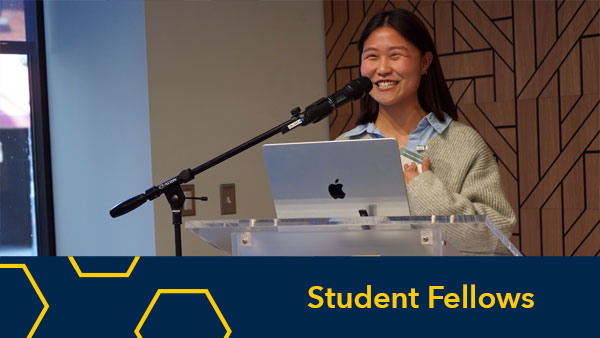Brenda Gunderson reflects on nearly a decade of ECoach in STATS 250
Sean Corp, Content Strategist
A decade-long journey began with a simple enough email. The subject heading read: “talk about ECoach and STATS 250.” Tim McKay sent that email to Brenda Gunderson because he knew she was interested in personalized learning and new ways to reach the 100-plus students enrolled in her STATS 250 course.
Gunderson, who retired in 2020 and now teaches STATS 404: Effective Communication in Statistics, has always believed in personalized learning and finding ways to connect with students at a deeper level. That didn’t prove easy, considering her course enrollments often stretched into the triple digits and seemed to keep growing.
McKay felt like there was a technical solution to a very human problem. McKay, the Arthur F. Thurnau Professor, now associate dean for undergraduate education in LSA, and a professor of physics, astronomy and education, worked with the Center for Academic Innovation to develop ECoach.
“It’s an electronic coach, but it’s very people-driven.”
Brenda Gunderson
The ECoach software allows educators to deliver individualized, tailored messages to students in large courses that make one-on-one communication impossible. McKay had seen positive results in his physics courses and wanted to discuss the potential with Gunderson.
Gunderson quickly saw the possibilities and jumped on board.
“The course did keep growing, and we had a team of instructors and a large group of GSIs, but we still really could use a team coach to help us communicate with our students in a more personalized way.”
Gunderson worked with behavioral and data scientists and software developers at the center to deliver personalized messaging and coaching to her students. By the Fall semester in 2013, ECoach was implemented in her STATS 250 course.
“As a teacher, personalized learning has always been a part of our thinking,” Gunderson said. “Having a tool that allows us to communicate and to give students content that’s personalized was certainly a big plus.”
Gunderson said that the people behind the software make ECoach a success.
“It’s an electronic coach, but it’s very people-driven.”
That includes the team at the center who worked with Gunderson to develop the software further, so it met her needs in a stats course just as well as in previous physics courses. It included the grad students who directly engaged with undergrad students and helped Gunderson plan tailored messages and interventions. Those undergrad students also gave feedback on their experiences using the tool to help improve it for future courses.
“I loved being able to learn about my students through this tool and what they were doing, including when they started their homework each week,” Gunderson said. “We were able to learn what they were doing so that we could tweak our approach as the course progressed.”
I treasure those interactions with the people who are part of the ECoach team.”
Brenda Gunderson
That customization and personalization are what most appealed to her in the first place, and the adaptability of the tool is one of the elements Gunderson most appreciates. She also highlighted specific features such as personalized to-do lists that she could send to students based on their progress and the Exam Playbook that helped students prepare for exams throughout the semester.
In the end, ECoach is a tool that allowed Gunderson to connect with students and provide personalized learning, goals that she had made a priority when she first started teaching in the 1980s. Gunderson says that the keys to delivering a personalized learning experience for students are to understand your goals, ask your students questions to know their needs better and, most importantly, understand that there are people who can help you.
ECoach has evolved quite a bit since those early conversations in 2012. Gunderson said some of her fondest memories are those early, challenging meetings in the Hatcher Library with staff at the Center for Academic Innovation working to prep for the first launch in STATS 250.
“I would walk up those eight flights of stairs, and walk down those eight flights … and every meeting with the team was always filled with smiles, filled with laughter, and brought a lot of happiness to my work,” Gunderson said. “It was an important part of my work and my educational background that I treasure. I treasure those interactions with the people who are part of the ECoach team.”


